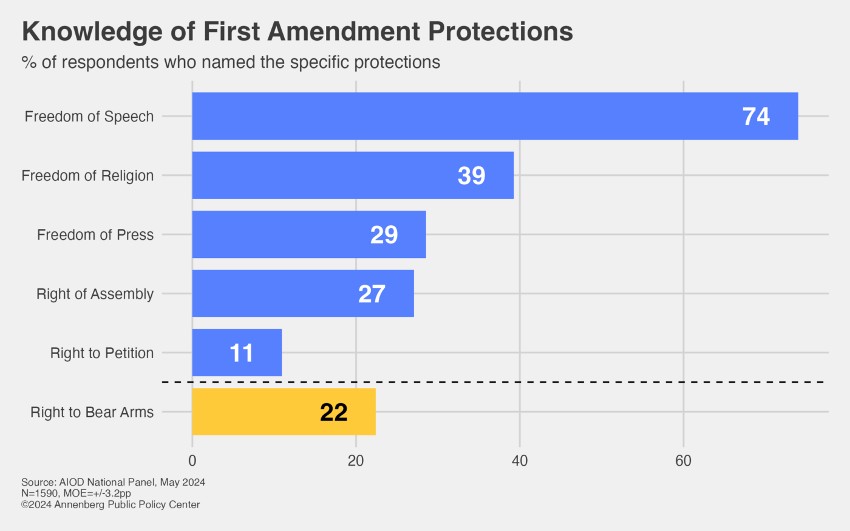Summary: A new survey reveals that less than half of Americans can name most First Amendment rights, while strong support emerges for Supreme Court reforms.
Estimated reading time: 7 minutes
The cornerstone of American democracy, the First Amendment, remains a mystery to many citizens, according to the latest Annenberg Constitution Day Civics Survey. This annual study, conducted by the Annenberg Public Policy Center of the University of Pennsylvania, sheds light on the state of civic knowledge in the United States and reveals some surprising gaps in public understanding.
The 2024 survey, which polled approximately 1,600 U.S. adults in May, found that less than half of Americans can name most of the rights protected by the First Amendment. This lack of awareness persists despite the amendment’s crucial role in safeguarding fundamental freedoms such as speech, religion, and press.
First Amendment Awareness: A Mixed Picture
When asked to name specific rights guaranteed by the First Amendment, respondents showed a clear disparity in their knowledge:
- Freedom of speech: 74% of respondents could name this right
- Freedom of religion: Only 39% recalled this protection
- Freedom of the press: Less than a third (29%) mentioned this right
- Right to assembly: 27% of respondents named this freedom
- Right to petition the government: A mere 11% recalled this right
Perhaps most concerning, only 7% of respondents could name all five First Amendment rights, while about one in five (21%) couldn’t name any.
Kathleen Hall Jamieson, director of the Annenberg Public Policy Center, emphasizes the importance of this knowledge: “Those who do not understand the rights protected by the Constitution can neither cherish nor invoke them.”
Beyond the First Amendment: Government Structure and Political Landscape
The survey also tested Americans’ knowledge of government structure and current political control:
- 65% of respondents could name all three branches of government
- 55% knew that Democrats control the Senate
- 56% were aware that Republicans control the House of Representatives
While these numbers show some improvement over past years, they still indicate significant gaps in civic knowledge.
Why It Matters
Understanding the structure and principles of government is crucial for active citizenship. Without this knowledge, individuals may struggle to participate effectively in the democratic process, hold elected officials accountable, or protect their own rights.
The survey’s findings highlight the ongoing need for robust civics education in schools and continued efforts to engage adults in learning about their government and constitutional rights.
Supreme Court Reforms: Public Opinion Shifts
In recent years, public trust in the U.S. Supreme Court has declined significantly. The Annenberg survey found that confidence in the Court dropped from 68% in 2019 to 46% in 2022, a 22 percentage point plunge.
Against this backdrop, the 2024 survey explored public support for potential Supreme Court reforms:
- 82% support prohibiting justices from participating in cases where they have personal or financial interests
- 77% back the creation of a formal ethics code for Supreme Court justices
- 69% support a mandatory retirement age for justices
- 68% favor implementing term limits instead of lifetime appointments
- 47% would support allowing public referenda to overturn controversial Supreme Court decisions
- 29% support increasing the size of the current nine-member Court
These findings suggest a growing appetite for change in how the nation’s highest court operates, with a particular focus on ethical considerations and term limits.
Addressing the Knowledge Gap
The Annenberg Public Policy Center isn’t just identifying the problem; it’s also working to address it. The organization has launched several initiatives to enhance civics education, including:
- Annenberg Classroom: Provides free resources for teaching the Constitution
- Civics Renewal Network: A coalition of 43 nonpartisan, nonprofit organizations offering free, high-quality resources for teachers
As the United States approaches another Constitution Day on September 17th, these efforts to bolster civic knowledge take on renewed importance. By improving understanding of the Constitution and the rights it protects, Americans can better participate in and preserve their democracy for future generations.
Quiz:
- What percentage of Americans could name all five First Amendment rights?
- How many respondents correctly identified freedom of speech as a First Amendment right?
- What percentage of survey participants support creating a formal ethics code for Supreme Court justices?
Answer Key:
- 7%
- 74%
- 77%
Further Reading:
- Annenberg Public Policy Center: https://www.annenbergpublicpolicycenter.org/
- The First Amendment: https://www.archives.gov/founding-docs/bill-of-rights-transcript
- The Supreme Court: https://www.supremecourt.gov/
If our reporting has informed or inspired you, please consider making a donation. Every contribution, no matter the size, empowers us to continue delivering accurate, engaging, and trustworthy science and medical news. Independent journalism requires time, effort, and resources—your support ensures we can keep uncovering the stories that matter most to you.
Join us in making knowledge accessible and impactful. Thank you for standing with us!

